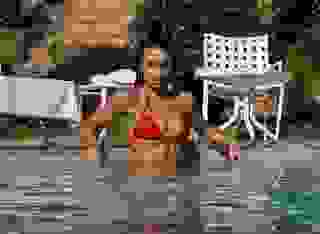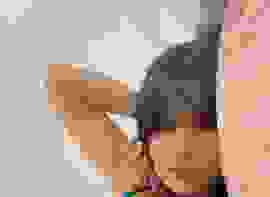Note: You can change font size, font face, and turn on dark mode by clicking the "A" icon tab in the Story Info Box.
You can temporarily switch back to a Classic Literotica® experience during our ongoing public Beta testing. Please consider leaving feedback on issues you experience or suggest improvements.
Click hereReluctantly Justina stepped back toward the door when her eyes fixed on the brass icon once more. Tunics didn't have pockets. If someone needed to carry a key he or she would have it made into a ring that could be worn on a finger or concealed in some manner where it could be easily retrieved. Porcia, she knew, didn't wear a key ring and wouldn't carry around numerous heavy brass keys when she didn't need them.
She went to the icon and turned it in her hand. An arm moved up and disengaged forming a key.
Quickly she opened the trunk and saw the mass of house keys strung on a braided leather thong lying upon a tunic and a recipe book. Potpourri scented the air. A small volume of Gaius' poetry stuck out from beneath the tunic. A leather pouch jingled with coins. She placed it back in the trunk.
She took the keys and replaced the arm on the icon.
Down the hall she unlocked the storage room door, and gathered up a handful of candles, lantern, flint, tinder, and two hooded cloaks which she stuffed into a coarse feed sack. In the kitchen, she lighted a candle from a wall lamp and placed it in the lantern, then went down more steps to the cellar. Unlocking the door she gathered up a block of smoked cheese, two round loaves of bread; dried figs, raisons, and olives from amphorae and placed them in the pillow case. Two bottles of Setine and two of Falernian, she stuffed in the coarse sack, then tied everything up in the blanket after putting on one of the wool cloaks. Going back upstairs, she replaced the house keys in the trunk and locked it.
In the atrium slaves milled about murmuring nervously to each other as soldiers roughly shoved some aside searching through rooms. Pitiful wails rose where a hapless slave here or there was trampled to the floor or bludgeoned with a hilt.
As Justina came out of the kitchen and stepped under the colonnade surrounding the peristyle she looked down the andron, the passageway to the atrium, and saw Ajax coming toward her.
"Is there a way out of here, Ajax?"
"Come with me."
He led her through the peristyle to the back of the house and into the open garden. As they came to the wall that surrounded the whole complex he took the lantern from her and the blanket wrapped bundle.
"Here."
He knelt down and motioned for her to stand on his shoulders. When she was balanced upright, her palms pressed against the wall, he rose until she was able to scramble onto the coping.
He handed up the lantern and the bundle. Then crouching down he sprang up with the ease and grace of a cat, grabbing the coping and pulling himself up next to her, then jumped down on the other side into a narrow alley that ran the length of the wall. Reaching up he took the bundle and lantern and helped her down.
"Good luck, little one."
"What will you do, Ajax?"
He smiled sadly without reply and disappeared back over the wall.
Y
The rain beat the cobblestones drowning out mundane sounds.
When she came to the street in front of the townhouse she saw soldiers standing in the light of lanterns at the front gate. She turned right as she had seen Gaius do after walking out.
She knew he couldn't have gone far in the pitch dark without a lantern. Only a blind man who had memorized all the twists and turns of the Caelian could have found his way about.
Rain dripped from spreading oaks in a small park.
Not far down the Vicus Cyclops, she found Gaius seated on a stone bench beneath one, slumped over.
She sat down next to him.
"You're getting wet."
Gaius stared at her face in the yellow halo of light cast by the lantern. He recalled the first time when he had seen that face in such a light.
"You're fresh out of luck if you're planning to rob me."
"Here," she said, untying the blanket and pulling out the cloak. "Put this on before you catch a fever."
He stood up and threw the cloak over his shoulders. His wet tunic was plastered to his lean body.
"Why are you helping me?" he asked, sitting back down.
"Because . . . because I know what it's like to lose everything in an instant."
Gaius was impassive.
"What are you going to do?" she asked.
"Haven't a clue."
"Well, at least, I know where we can go to get out of the rain until you do."
Gaius reached down, retied the corners of the blanket, stood up and slung it over his shoulder.
"Lead on."
The street streamed with water as they continued down the Vicus Cyclops. When they came to the Drusianus, she led him to the right down the slope of the Caelian to where the Via Appia ran near the Tiber outside Rome. To the right, hidden from view in the night, were bath houses and farther on toward Rome the Arch of Capena which was undergoing repairs as part of Domitian's rebuilding program after the massive fire of 80 during his brother Titus' reign.
Turning to the left, she led him south past majestic mausolea of the wealthy and amphorae stuck into the ground to mark the anonymous burials of the poor.
There were miles of such monuments along the Appia. They didn't go far until they turned off and made their way through a narrow, dripping walkway.
The oldest tombs, going back hundreds of years, were the ones closest to the outer perimeter of the Servian Wall. In the light of the lantern they could see where doors had been forced open, generations ago, by robbers looking for valuables buried with the cremains or inhumations: bejeweled items of silver, gold and ivory such as earrings, necklaces, bracelets, brooches, fillets as well as vases, plates, statuettes, children's toys and toilet articles of all sorts intended to make the afterlife more pleasant for the departed.
Nothing in these would remain now. Just empty hulks, ashes and dust.
Rain splattered on the muddy walkway as they came to a gable-roofed tomb of two stories with masonry couches flanking a lead sheathed door. Justina held the lantern out until they could see that it was slightly ajar. Someone had taken an axe to it splintering the wood underneath its lead covering.
Above the lintel was the following inscription:
--To the spirits of the departed. Decius Cornelius Lepidus,
son of Decius, built this for himself and for Sabina Galla,
his well-deserving wife, and for their children and ex-slaves,
male and female, and for their descendants. This tomb shall
not pass to an heir outside the family or be sold by those to
whom I have left it or to Galla.--
Gaius leaned his shoulder against the door and pushed. A creaking sound rose to a loud crack as it scraped back across a broken mosaic floor.
Stooping, they entered the low-set entrance, and inside, suddenly out of the gusting wind and rain, the lantern flame steadied over a square vestibule fronting a cella whose upper walls were lined with niches for cremains and a larger area at bottom for inhumations. To the left were stairs to an upper chamber and next to it an archway opening on a darkened precinct.
In front of an altar, dedicated to a statue of Minerva, was a stripped down litter that had been placed in the cella to carry the spirit of the founder, Lepidus, to the afterlife. Its silk curtains and coverings had long since been thieved leaving only the bare remains of the wooden couch beneath its canopy.
In stark contrast to the dreary exterior of the tomb the interior was a colorful arrangements of mythological depictions from floor to ceiling that the decades of time had done little to fade: On the floor Charon's barque, the Muses, Endymion and Selene, and other such scenes were laid out in colorful mosaics.
Exotic birds, frozen in time, flew up the walls where coffers held lions attacking various prey; gladiators dealt endless death blows and Hercules performed again his twelve labors.
Sarcophagi, around the bottom of the walls, were adorned with garlands and scenes of marriage, funerary banquets, business scenes, revelling Cupids, and shepherds silently piping from a distant age.
Gaius moved to the litter, placing the bundle of goods on one end, and sat down on its network of leather ribbing cupping his head in his hands.
"Nice," he mumbled. "At least we won't have to sleep on the floor."
Loosening the blanket he set the loaded burlap bag and pillowcase on the floor, then, standing up, shook it dry and spread it on top of the netting.
Yawning, he took off his wool cloak and shook it dry, too, tossed it onto the litter and stripped off his tunic. Lying down he watched Justina shake out her cloak.
The lantern light cast an ethereal glow over her, almost as if she were a nymphet stepped free from the shadowy walls. Mesmerized, his eyelids drooped as she placed her cloak over him.
In a dream, it seemed, she moved next to him. The light went out. Sleep came.
Chapter VIII
Lucius Horatius Calvus was sitting at a small desk in the family library puzzling over several documents spread out before him as his teacher, Aeschylus, entered.
"Why the long face, Lucius? I take it's not the dreary rainfall," he said, nodding toward a window that overlooked the large rear garden of the townhouse where rain splattered on brick and stone. Several lamps lightened the gloom of the overcast morning.
"No, I've just been going over the Orphic belief in the grievous circle as expounded by Philolaus. Very depressing."
"Y-e-s," Aeschylus said, drawing out the word in a thoughtful, sonorous fashion as he took a seat across the table from his longtime pupil. He stroked his graying, neatly trimmed beard, his chiseled face passive, the dark eyes keenly set.
"Eternal recurrence as the Pythagoreans like to call it . . . and it depresses you?"
"How can it not? The thought that we could relive our lives over and over for all eternity."
"Hmm, the hour glass turned over and over, and you with it, a grain of sand."
"Yes. It seems much like a torment out of the Christian hell." Lucius flicked his wrist over the pile of documents, then leaned back in his chair with a disgruntled sigh. "The more I learn the more I envy the happy fool."
"The fool can never be happy, Lucius, my young prodigy. Remember the teachings of your Epicurus: it is impossible to live a pleasant life without living wisely. More over, it is death we have to contend with--not eternal recurrence. And death is nothing to us; for that which has been dissolved into its elements experiences no sensations, and that which has no sensations is nothing to us. To anticipate that which cannot be painful should not cause pain."
Lucius smiled. "You are always wise, Aeschylus, but why am I not convinced?"
"Because you lack sufficient knowledge . . . it will come in time."
"And what is the point . . . of all this?" Lucius raised his arms to indicate existence.
"To life?"
"Yes."
"We cannot perceive what lies beyond our senses, although some claim to. Pythagorous, as you know, believed in the transmigration of souls, that we are continuously reborn in one form or another; stoics, like your Seneca, believed the universe was unending and that there is no afterlife. Only God was for him immortal. He would say we live a good life, one of virtue, because that is the only way to be happy. And Epicurus would agree, however, using different terminology. Both taught that we must not strive after some mythical afterlife but, instead, seek to enjoy the life we have. One life sufficiently lived is all one needs."
"But it still seems so pointless," Lucius said, glancing out the window for a moment to stare at the swilled gray clouds.
"That's because you still yearn after something that is beyond your power to control. You must learn to be content with what you have and not worry about what you cannot have -- or you will never be happy."
"And what about you, Aeschylus, are you content?"
Aeschylus pulled softly at his beard, raising his left eyebrow slightly. "Yes, because I don't concern myself with the unanswerables."
At that moment a servant entered the library.
"Master Lucius, your father has returned from the senate and request your presence on an urgent matter."
A puzzled frown formed on Lucius' face; he rose, nodding at Aeschylus and followed the servant out.
Y
The mosaic on the floor of the tablinum showed a bearded Neptune rising from swirling foam holding a trident over his head. The wide double doors separating it from the peristylium were open. Niches on one wall held busts of the family's forebears.
Decimus Horatius Calvus stood next to a desk of burled ebony on which sat a brass lamp and several leather clad scrolls. To one side was a ivory curule with ball finials on each corner. A chair garnered from a year he had served as consul to Vespasian. A couch decorated in gold with purple fabric dyed from murex shells stood against the wall next to a burnished scroll rack.
From the atrium beyond rain drops falling through the rectangular opening in the ceiling, the compluvium, made pebble-like sounds as they pelted the polychrome tiled basin of the impluvium sunk in the floor.
"Father, what is it?" Lucius asked, anxious, seeing the disturbed look on the worn, patrician face.
Decimus, a thick, broad-shouldered man, looked through troubled eyes at his slender son.
"I have bad news. Gaius' father has been executed for treason. His head hangs from the rostra at this moment and all of his property has been confiscated by the emperor."
Lucius froze for a moment as he tried to absorb what he was hearing.
"This is unbelievable. What's happened to Gaius?"
Decimus shrugged. "Gone. From what I understand the frumetarii have taken over the townhouse and driven him off. But I have no idea were he is."
"When did this happen?"
"Last night. I learned of it when I arrived at the Senate this morning. It was abuzz with rumors."
"By the Gods, where could he be? Why hasn't he come to us? We have to find him, father."
"But how? He could be anywhere."
"He'll come here." Lucius said. "I'm his friend; he knows that."
Decimus glanced away for an instance. When he turned back Lucius detected unease in the troubled eyes.
"Father?"
"I know how close you two are, like brothers, but it might not be wise to have anything to do with him at the moment. Spies are everywhere in Rome. If word should get to the emperor that we were helping the son of a traitor we might be suspected of treason, too. I think that's why Gaius hasn't come to us for help. He doesn't want to involve us in his troubles."
"I can't desert a friend in need, father."
Decimus frowned. With a grunt he lowered himself onto the curule and squeezed the round finials with his burly hands; the glint of the gold signet ring on his right hand flashed like a warning.
"Iiiaa. Wasn't it Plato who said a man should study mathematics for ten years in order that he learn to reason abstractly?"
"Yes. To lift the mind above mundane considerations in order to apprehend the aim of philosophy, the idea of the Good; he had the admonition over the door to his Academy that no one ignorant of mathematics should enter--but why?"
Decimus smiled distantly. "When I was young, like you, I was a firm believer in seeking the Good: virtue, truth and all that, but when I became an adult I discovered that in the real world what is good, virtuous and true are not always as important as compromise, accommodation, and obfuscation.
It is something you will have to face eventually. It is important to know the truth, for ones own benefit, of course, but expressing it can be a very dangerous matter. Instead of philosophy the truly wise would be better instructed in rhetoric." Decimus chuckled with a sarcastic tone, "The art of . . . persuasion ---"
"The art of insincerity, you mean, where the goal is not truth but winning at all cost."
"Yes," Decimus shrugged. "But, like it or not, if you're not a winner you're a loser --and that can't be a proper goal in anyone's philosophy."
"Socrates thought the truth worth dying for."
Decimus glanced at the cutain that separated the atrium from the tablium as a gust of wind tangled with it, then back at Lucius.
"It's not a good time to be a philosopher, Lucius," Decimus said. He looked around slowly and lowered his voice. The emperor is becoming more paranoid day by day. Rumor has it he intends on passing a decree to exile all philosophers from Rome. Like his father Vespasian who expelled all those who he believed were speaking out against him."
"But I have never said anything against the emperor."
"Not now perhaps, but in your search for truth wouldn't integrity compel you to speak out against his immorality and cruelty someday? Already the philosopher and mystic Apollonius of Tyana, now in Egypt, has been accused of speaking against the emperor, by that weasel-dick Euphrates the Stoic, causing Domitian to issue a summons for his arrest, and he will surely be put to death if caught.
Now this trouble with Saturninus has placed you, as well as your family, doubly in danger." Decimus raised his hand from a finial curtly as if tossing something over his shoulder. "For your own safety, and ours, I think it best you go to Greece, perhaps, for awhile. If you decide to continue your philosophical studies there at least you will be safe, but I would recommend that you take up the pursuit of law as a career. "
Chapter IX
When Gaius awoke he thought he was home in his bed, the warm body lying next to him Messalina's, but, then, pale northern light coming through loopholes above the lintel shown on the tomb walls and the yellow hair of Justina.
It was still raining. Faint gurgling sounds reached his ears.
He stared at the golden outline of her face for a moment. What to do?
He got up and slipped on his tunic, still damp, then his wool cloak.
Justina raised up on her elbow and stared at him. "What are you going to do?"
"Find a game." He fingered the gold chain and pendant around his neck. "My bulla will give me a buy in."
"Do you want me to wait for you?"
"I'll be back."
"You don't have shoes."
"I'll go barefoot. People will think I'm some harebrained philosopher."
"I packed food and drink."
"When I get back. You'll be alright while I'm gone?"
Justina pulled out a folding knife and flicked the blade open with her thumb.
Gaius smiled wryly.
Y
The tightly woven wool cloak was waterproof. Gaius pulled the hood up over his head as he slushed along on a muddy path that wound among haphazardly oriented tombs to the Via Appia.
Few people were about in the rain. As the Via Appia curved up toward the amphitheater Gaius cut through way streets coming out at the south side of the Circus Maximus where he made his way past the dozens of archways sheltering vendors of various goods, taverns and bored looking whores leaning against entrance ways.
"Gaius, sweetheart, is that you?"
Gaius turned his head blinking against the rain.
Standing in a tavern archway was Vassus, a fat German freedman who had made a fortune pimping, buying and selling slaves and speculating on various shady business enterprises. Huddled at his feet was a girl child on a chain leash. A Nubian slave held a folded leather umbrella. Several archways down bearers waited with a gilded litter.
The smell of sizzling sausage and wine warming in amphorae, stuck in a marble counter top, wafted out as he walked toward the fat man who raised an eyebrow coquettishly.
"How do you like my latest pet, Gaius?" Vassus said, jerking on the chain. The child opened her mouth in a silent pantomime of torment revealing a fresh blackened hollow. It was a common practice among abductors to cut out the tongues of their victims so they couldn't testify against them. She gazed about in a dazed fashion, her tiny body trembling uncontrollably.
The tavern manager turned a roll of sausage on a grill behind the counter to the hot sound of grease popping. In a corner a burly bouncer, most likely an ex wrestler, sat on a stool watching a group of men playing knucklebones on a square table.








